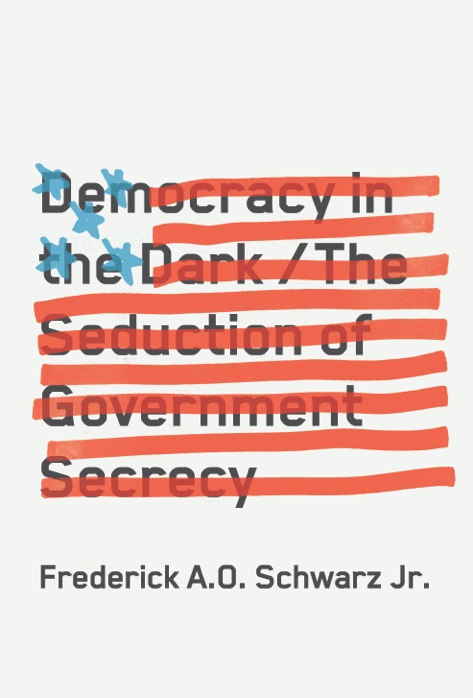From Dick Cheney’s man-sized safe to the National Security Agency’s massive intelligence gathering, secrecy has too often captured the American government’s modus operandi better than the ideals of the Constitution. In this important new book, Frederick A.O. Schwarz Jr., who was chief counsel to the U.S. Church Committee on Intelligence — which uncovered the FBI’s effort to push Martin Luther King Jr. to commit suicide, the CIA’s enlistment of the Mafia to try to kill Fidel Castro, and the NSA’s thirty-year program to get copies of all telegrams leaving the United States—uses examples ranging from the dropping of the first atomic bomb and the Cuban Missile Crisis to Iran Contra and 9/11 to illuminate this central question: how much secrecy does good governance require?
Schwarz argues that while some control of information is necessary, governments tend to fall prey to a culture of secrecy that is ultimately not just hazardous to democracy but antithetical to it. This history provides the essential context to recent cases from Chelsea Manning to Edward Snowden. Democracy in the Dark is a natural companion to Schwarz’s Unchecked and Unbalanced, co-written with Aziz Huq, which plumbed the power of the executive branch — a power that often depends on and derives from the use of secrecy.
THE REVIEWS
“Filled with powerful and colorful stories and new analyses, this book will be great reading for citizens and government officials alike.” —former Vice President Walter Mondale
“Schwarz is among the many quiet patriots who are spreading the word that the very meaning of the United States, the whole point of this fragile experiment in representative democracy, will be lost if the nation’s ironclad commitment to the rule of law is allowed to unravel.” — Bob Herbert, former New York Times op-ed columnist
“A thoughtful, highly informed, and carefully researched analysis of one of the most fundamental challenges facing our nation today. He highlights secrecy’s dangers to democracy but also acknowledges that secrecy is sometimes essential to national security. His effort to help us strike the right balance between democracy and secrecy is his greatest—and truly insightful—contribution.” — Geoffrey R. Stone, member of President Obama’s Review Group on Intelligence and Communications Technologies and author of Top Secret: When Government Keeps Us in the Dark
“No one writes about the hazards of secrecy as clearly and convincingly as does Frederick A.O. Schwarz in this important book. It should be required reading for every citizen who seeks to bring sunlight into the darkened corridors of government that endanger America’s democracy.” — Loch Johnson, editor of Intelligence and National Security
For more information, read:
- American Declassified (Wall Street Journal, April 28, 2015)
- Our Intelligence Apparatus, Operating in the Dark (Washington Post, April 6, 2015)
- Embarrassment – Not Security – Drives Government Secrecy (The Guardian, March 9, 2015)
- Democracy in the Dark (Publisher’s Weekly, January 5, 2015)
- The Secret Is Out (MSNBC, April 9, 2015)
- Mass Surveillance: From the War on Drugs to the War on Terror (CATO Institute, April 9, 2015)
- FRUS on Investigating Intelligence in the 1970s (Federation of American Scientists, April 8, 2015)
- Frederick A.O. Schwarz Jr.: “Democracy In The Dark: The Seduction Of Government Secrecy” (NPR, April 6, 2015)

